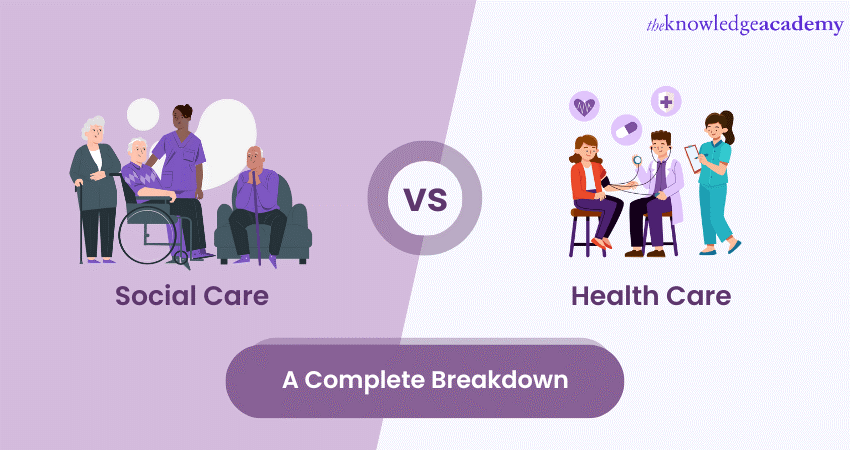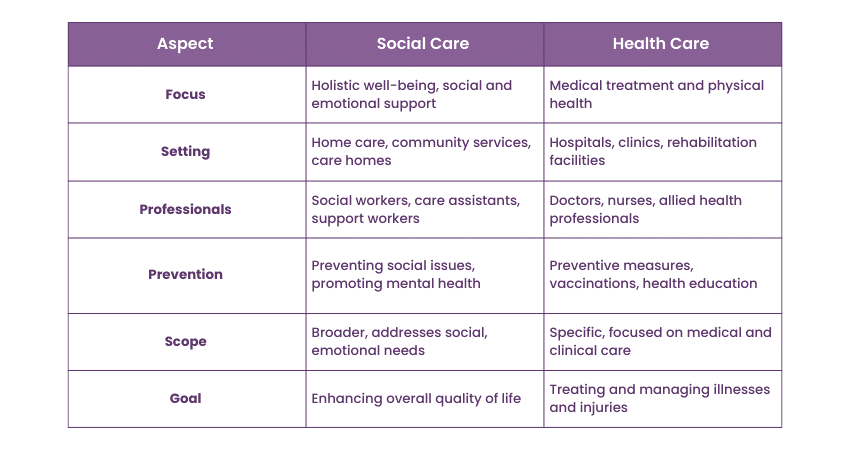We may not have the course you’re looking for. If you enquire or give us a call on +44 1344 203 999 and speak to our training experts, we may still be able to help with your training requirements.
Training Outcomes Within Your Budget!
We ensure quality, budget-alignment, and timely delivery by our expert instructors.

Are you wondering about the differences between Social Care vs Health Care? Even though both involve caring for people, there are several differences between them. It's important to understand the differences between them, especially when dealing with the various responsibilities that come with Social and Health Care.
Recognising these differences ensures that you take a more informed approach to contributing meaningfully to the well-being of individuals in need. In this blog, we will discuss Social Care vs Health Care, pillars of Social Care, sectors of Health Care, similarities between them and more.
Table of Contents
1) What is Social Care?
2) Four Pillars of Social Care
3) What is Health Care?
4) Sectors of Health Care
5) Social Care vs Health Care
6) How interconnected are the Health Care and Social Care?
7) Conclusion
What is Social Care?
Social Care is dedicated to aiding older individuals and those with learning, physical, or mental challenges in their daily activities. Assistance can span from personal care to facilitating social engagements. Social care environments are categorised into residential zones, like care homes, and community services, such as Extra Care Housing and daycare. Hospices offering respite stays may also be seen as a part of the Social Care spectrum.

Four Pillars of Social Care
The foundation of Social Care comprises four pillars, which are discussed below.
1) Social work
Social work is a fundamental pillar involving professionals who assess, support, and advocate for individuals facing challenges. These experts collaborate with service users, families, and communities to address diverse needs, promoting well-being and social inclusion.
2) Personal care
The provision of personal care is essential, encompassing assistance with daily activities such as bathing, dressing, and grooming. This pillar ensures individuals receive the necessary support to maintain their dignity and independence.
3) Protection
Protection is a critical aspect, involving measures to safeguard vulnerable individuals from harm or exploitation. Social care services actively work to identify and mitigate risks, ensuring the safety and well-being of those in need.
4) Social support
Social support focuses on fostering connections and relationships within communities. This pillar aims to reduce isolation and enhance individuals' social integration, contributing to improved mental and emotional well-being through community engagement and support networks.
What is Health Care?
Healthcare is centred around addressing, managing, and sometimes preventing injuries, diseases, or disabilities. It encompasses care during and after treatment. Diverse healthcare settings, such as General Practitioner (GP) services, hospitals, dental facilities, and rehabilitation services like physiotherapy, play vital roles in delivering comprehensive care.
Health Care also includes preventive measures like vaccinations and health education to promote overall well-being. It involves a multidisciplinary approach, with healthcare professionals such as doctors, nurses, and allied health professionals collaborating to provide patient-centric care. Additionally, advancements in medical technology enhance the delivery of healthcare services, ensuring patients receive the most effective and efficient treatments possible.
Build your skills with Personal Development Training and stay ahead of the learning curve!
Sectors of Health Care
The healthcare sectors collectively form a comprehensive healthcare system, addressing diverse aspects of individual well-being. Discussed below are a few of them.
1) Hospital care
Hospital care constitutes the primary sector in healthcare, offering specialised medical services for acute illnesses, surgeries, and emergencies. It serves as a crucial facility for advanced diagnostics, treatment, and post-operative recovery.
2) Primary care
Primary care forms the foundation of healthcare, providing routine and preventive services. General practitioners and community clinics play a key role in this sector, offering initial medical assessments, vaccinations, and ongoing health management for individuals and families.
3) Public health
Public health focuses on community well-being and preventive measures. This sector addresses population health through initiatives such as disease prevention, health education, and policy development, aiming to enhance overall health and reduce the incidence of illnesses on a broader scale.
Social Care vs Health Care
A key difference between Health Care and Social Care systems lies in their service delivery methods. The National Health Service (NHS), the publicly funded national Health Care system in the UK, delivers Health Care services, offering free assistance to those in need. Conversely, Social Care services are managed by local authorities, whose spending authority may require government approval.
A significant segment of the world's population falls into the senior citizens category, a direct result of population growth. Fortunately, Health Care services strive to operate optimally, contributing to people living longer than anticipated. Conversely, Social Care services grapple with complex issues due to the discrepancy between individual and public responsibilities.

Improve your understanding of building a strong foundation for making new friends with Social Skills Masterclass! Sign up now!
How interconnected are the Health Care and Social Care?
Health Care and Social Care are closely interconnected, working hand in hand to support individuals. Although they are different in nature and execution, they share a common goal of enhancing well-being. Health Care primarily focuses on medical needs, offering treatments and maintaining physical health. Social Care, on the other hand, addresses a broader spectrum, catering to social, emotional, and psychological aspects.
For instance, a nurse's skills in providing care and communication are applicable in both domains. This interconnectedness ensures an outward approach to individual welfare. Even though both deal with different aspects of care, they can improve an individual’s overall health and happiness.
Conclusion
Social Care and Health Care may have different focuses, but they work together to improve people's well-being. The similarities in required skills and professionals between these areas show how they are connected and contribute to complete care for individuals. Hope you have enjoyed reading our blog!
Discover the practical application of emotional intelligence in organisational settings through our Emotional Intelligence Training. Join now!
Frequently Asked Questions
Upcoming Business Skills Resources Batches & Dates
Date
 Social Skills Training
Social Skills Training
Fri 31st Jan 2025
Fri 25th Apr 2025
Fri 13th Jun 2025
Fri 22nd Aug 2025
Fri 24th Oct 2025
Fri 19th Dec 2025







 Top Rated Course
Top Rated Course


 If you wish to make any changes to your course, please
If you wish to make any changes to your course, please


